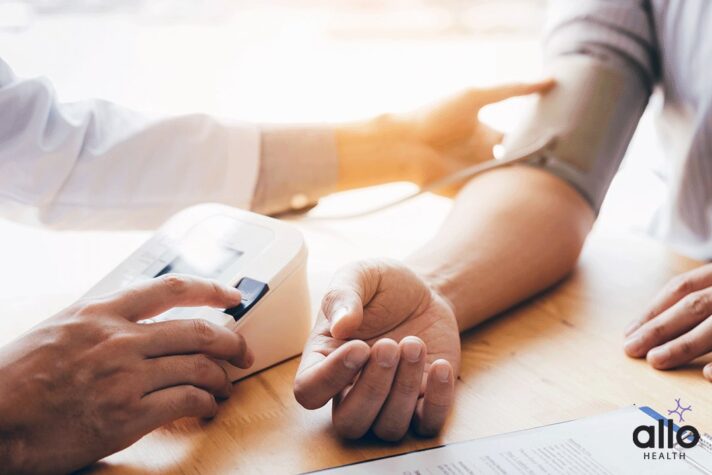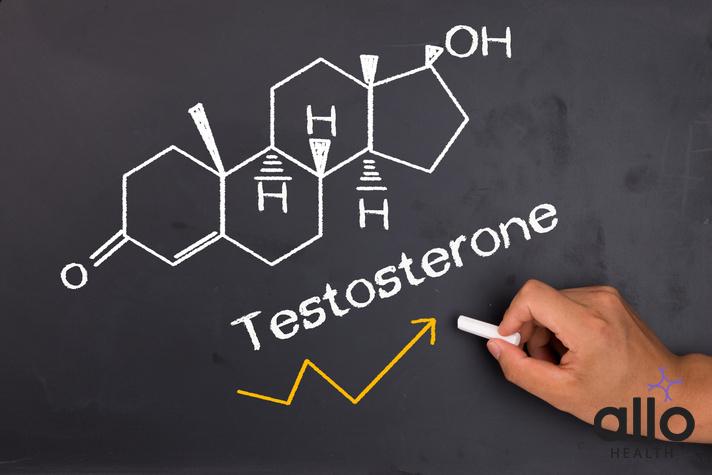Can Masturbation Cause Erectile Dysfunction?

Allo Health is dedicated to personalized well-being, offering support and trusted information tailored to individual health goals. The platform emphasizes human-generated content, led by a distinguished medical team of experts, including physicians and sexual health specialists. Their commitment to credibility involves rigorous fact-checking, authoritative research, and continuous updates to ensure accurate, up-to-date information. Allo Health's unique approach goes beyond conventional platforms, providing expert-led insights and a continuous commitment to excellence, with user feedback playing a crucial role in shaping the platform's authoritative voice.

A Psychotherapist with Clinical specialization, working for over seven years now. Areas of specialization range from Anxiety-related disorders, Mood-related disorders, Personality disorders, Sexual dysfunctions & other mental health issues.
Why This Was Upated?
Our experts continually monitor the health and wellness space, and we update our articles when new information became available.
Updated on 21 June, 2024
- Article was updated as part of our commitment to diversity, equity, and inclusion.

"The following blog article provides general information and insights on various topics. However, it is important to note that the information presented is not intended as professional advice in any specific field or area. The content of this blog is for general educational and informational purposes only.
Book consultation
The content should not be interpreted as endorsement, recommendation, or guarantee of any product, service, or information mentioned. Readers are solely responsible for the decisions and actions they take based on the information provided in this blog. It is essential to exercise individual judgment, critical thinking, and personal responsibility when applying or implementing any information or suggestions discussed in the blog."
There is a widespread rumor that excessive masturbation or a masturbation addiction can lead to sexual dysfunctions such as ED. It is one of the many myths about masturbation. However, as backed by scientific data, masturbation should not affect an individual’s ability to develop or sustain a healthy erection during sex. But, there could be an association – unrelated to cause and effect – between excessive masturbation and sexual dysfunction.
Men who excessively masturbate become habituated to being stimulated in that specific way. This then makes it difficult for them to be stimulated during sex with a partner, or any other
form of stimulation causing disrupted erectile function in those instances. Another fact is that sometimes individuals are unable to get an erection after excessively masturbating. This, however, has everything to do with the male refractory period — the recovery time a man goes through before he can get an erection again.
Can Masturbation Cause Erectile Dysfunction?
First of all, it’s important to understand that ED is a complex condition that can have many different causes. It occurs when a man has difficulty getting or maintaining an erection sufficient for sexual intercourse. ED can be caused by physical concerns, such as heart disease, high blood pressure, and diabetes, or psychological concerns, such as stress, anxiety, and depression.
Now, let’s address the question of whether masturbation can cause ED. There is no scientific evidence to suggest that masturbation causes ED. In fact, some studies have even found that masturbation can actually improve sexual function by increasing blood flow to the genitals and helping men better understand their own bodies and what feels good to them.
That being said, it is possible for men to develop bad habits during masturbation that can interfere with their ability to get an erection with a partner. For example, if a man consistently masturbates in a certain way (such as using a very tight grip), he may struggle to get an erection with a partner due to a change in the type of stimulation he is used to. In this case, the concern may be more related to the man’s psychological response to the different type of stimulation, rather than a physical cause of ED.
Erectile dysfunction (ED) can stem from a range of health issues, encompassing both psychological and physical factors. These factors can be diverse and varied, influencing the development or contribution to ED. It is important to recognise that ED is a multifaceted condition with potential causes that span across different aspects of an individual’s overall well-being.
Masturbation is a normal and healthy sexual activity that is not linked to the development of ED. However, if bad habits are developed during masturbation that interfere with the ability to get an erection with a partner, it may be helpful to seek out the advice of a healthcare provider or a sex therapist.
Does Masturbation Increase Blood Pressure?

Many people wonder if masturbation has any effect on physical health, including blood pressure. So, does masturbation increase blood pressure?
The short answer is no, masturbation does not have a significant effect on blood pressure. While it’s true that sexual activity, including masturbation, can cause a temporary increase in blood pressure, this effect is usually short-lived and not harmful.
During sexual arousal, the body experiences a range of physical changes, including increased heart rate, blood flow, and blood pressure. These changes are a normal part of the body’s sexual response and are not cause for concern. After orgasm, these changes typically return to normal within a few minutes.
It’s also worth noting that there is no scientific evidence to suggest that masturbation has any long-term effects on blood pressure. While some people may claim that masturbation causes high blood pressure or other health problems, these claims are not supported by scientific evidence.
Porn addiction has been a hot topic in recent years, with many studies exploring the potential negative effects it can have on individuals and their relationships. One area of concern is the potential for porn addiction to cause erection dysfunction, also known as erectile dysfunction or ED.
Erection dysfunction is the inability to achieve or maintain an erection sufficient for sexual intercourse. It is a common problem that can be caused by a variety of factors, including physical conditions such as heart disease and diabetes, as well as psychological concerns such as stress, anxiety, and depression.
Interesting Fact
Although it is a common belief, masturbation does not directly cause anxiety. In fact, it can have temporary stress-relieving effects due to the release of endorphins. However, excessive or compulsive masturbation habits could potentially be a manifestation of underlying anxiety or be influenced by anxiety-related factors.
Recent research suggests that there may be a link between porn addiction and ED. One study published in the Journal of Sexual Medicine found that men who reported excessive use of internet pornography had significantly lower erectile function compared to those who did not report such use.
Another study published in the same journal found that men with porn addiction were more likely to report problems with erectile function, as well as low sexual desire and difficulty orgasming during partner sex. Learn more about porn addiction and its link to sexual dysfunction.
While the research on this topic is still in its early stages, it is clear that there is a correlation between porn addiction and ED. It is important for individuals to be aware of this potential connection and to seek help if they are experiencing problems with porn addiction or ED. Treatment options may include therapy, medication, or a combination of both.
If you or someone you know is struggling with porn addiction or ED, it is important to seek help from a qualified healthcare professional. They can help you identify the underlying causes of your concerns and develop a treatment plan to help you overcome them. Remember, you are not alone and there is help available.
Does Masturbation Increase Testosterone Levels?

It is a common question among men whether masturbation can affect their testosterone levels. In this blog, we will explore the relationship between masturbation and testosterone to help clear up any misconceptions or doubts.
Testosterone is a hormone that is produced by the testicles in men and is responsible for the development of male characteristics such as a deeper voice, facial hair, and muscle mass. It is also involved in the production of sperm and plays a role in sex drive.
There is a common myth that masturbating can lower testosterone levels or cause a decrease in sperm count. However, scientific research has found no evidence to support these claims. In fact, several studies have shown that masturbation has no effect on testosterone levels.
One study conducted by the Department of Urology at the University Hospital in Essen, Germany, found that men who masturbated three times a week had the same testosterone levels as men who abstained from masturbation.
Another study published in the Journal of Sexual Medicine found that men who masturbated daily had higher testosterone levels compared to those who abstained.
Masturbation does not increase or decrease testosterone levels. Everyone’s body is different and what works for one person may not work for another. If you have any concerns about your testosterone levels or sexual health, it is always best to consult with a healthcare professional.
Risk Factors Of Masturbation Addiction
Masturbation is a normal and healthy part of human sexuality. However, like anything, it can be taken to excess and become an addiction. Here are some risk factors for developing a masturbation addiction:
- Stress and anxiety: Some people may turn to masturbation as a way to cope with stress or anxiety. This can become an unhealthy coping mechanism if it becomes the go-to method for dealing with negative emotions.
- Loneliness: Masturbation can be a way to cope with feelings of loneliness or isolation. However, if it becomes a substitute for real human connection, it can lead to an addiction.
- Pornography use: Some people may become addicted to pornography, which can lead to an excessive focus on masturbation. The constant exposure to sexual stimuli can change the brain’s reward pathways and lead to compulsive behavior.
- Relationship problems: If a person is unhappy in their current relationship or lacks a satisfying sexual connection with their partner, they may turn to masturbation as a way to fulfill their needs. This can lead to an addiction if it becomes the primary source of sexual satisfaction.
- Low self-esteem: People with low self-esteem may turn to masturbation as a way to feel good about themselves. However, if this becomes the primary way to boost self-esteem, it can lead to an unhealthy reliance on the behavior.
If masturbation it begins to interfere with daily life and relationships, it may be time to seek help. A mental health professional can help identify the root causes of the addiction and provide treatment options.
What are the Actual Effects of Masturbation?
Masturbation can have various effects, including:
- Pleasure and sexual satisfaction: Masturbation is a natural and healthy way to explore one’s body and experience sexual pleasure.
- Stress relief and relaxation: Masturbation can release endorphins and provide a temporary sense of relaxation and stress reduction.
- Improved sleep: Orgasm achieved through masturbation can promote better sleep quality due to the release of hormones like prolactin and oxytocin.
- Sexual self-awareness: Masturbation can help individuals understand their own sexual preferences, desires, and responses, contributing to a healthier sexual life overall.
While masturbation has some positive effects, it is not without potential side effects. Learn about the side effects of masturbation.
Key Takeaways
- There is no scientific data backing a link between masturbation and erectile dysfunction (ED), but excessive or habituated masturbation habits may interfere with sexual arousal during partner interactions.
- Erectile dysfunction can be caused by various factors, including medical conditions such as diabetes, cardiovascular disease, hormonal imbalances, psychological factors like anxiety or depression.
- Masturbation does not increase blood pressure significantly and has no long-term effects on blood pressure.
- There is a correlation between porn addiction and erectile dysfunction (ED), but further research is needed to understand the relationship fully.
- Masturbation does not increase testosterone levels. Scientific studies have shown no significant impact on testosterone levels.
- Risk factors for developing a masturbation addiction include stress and anxiety, loneliness, pornography use, relationship problems, and low self-esteem. Seeking help from a healthcare professional or therapist is recommended if masturbation starts to interfere with daily life.
Frequently Asked Questions
Q. Does masturbation cause ED? If not, what does?
A. No, masturbation does not cause erectile dysfunction (ED). Erectile dysfunction can be caused by various factors, including psychological and emotional factors, underlying conditions such as diabetes, cardiovascular disease, hormonal imbalances, psychological factors like anxiety or depression, and certain medications. Lifestyle factors such as alcohol consumption and tobacco use can also cause ED. It is important to consult a healthcare professional for a proper diagnosis and appropriate treatment if experiencing symptoms of ED.
Q. Can masturbation cause premature ejaculation?
A. No, excessive masturbation does not directly cause premature ejaculation. Premature ejaculation is typically related to various factors such as psychological issues, performance anxiety, or underlying health conditions. It is important to seek professional advice for a comprehensive understanding of the causes and potential treatments for premature ejaculation.
Q. How much is excess masturbation?
A. The frequency of masturbation can vary from person to person, and what is considered excessive can also differ. It is generally considered excessive if it interferes with daily life, responsibilities, relationships, or causes physical discomfort. It is important to maintain a healthy balance and listen to your body’s needs and boundaries.
Q. What are the health benefits of masturbation?
A. Masturbation can have several health benefits, such as stress reduction, improved sleep quality, and increased relaxation. It can also promote sexual self-awareness, enhance your sex life and help relieve menstrual cramps in some individuals. However, individual experiences may vary, and it’s essential to maintain a balanced approach to sexual activity.












































